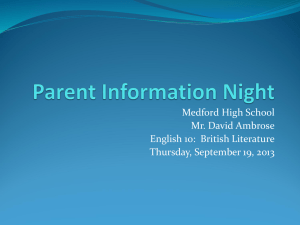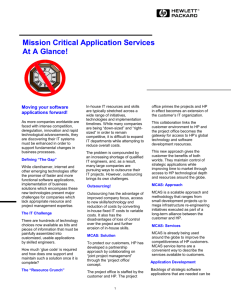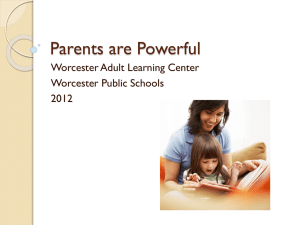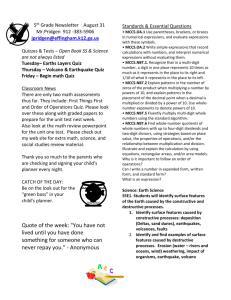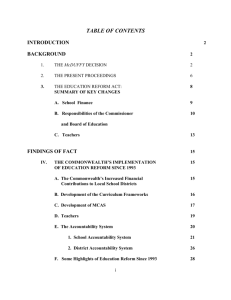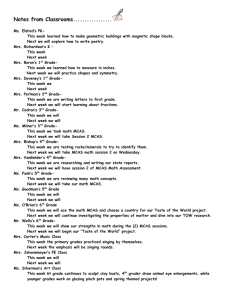Individual Student Success Plans - Massachusetts Department of
advertisement
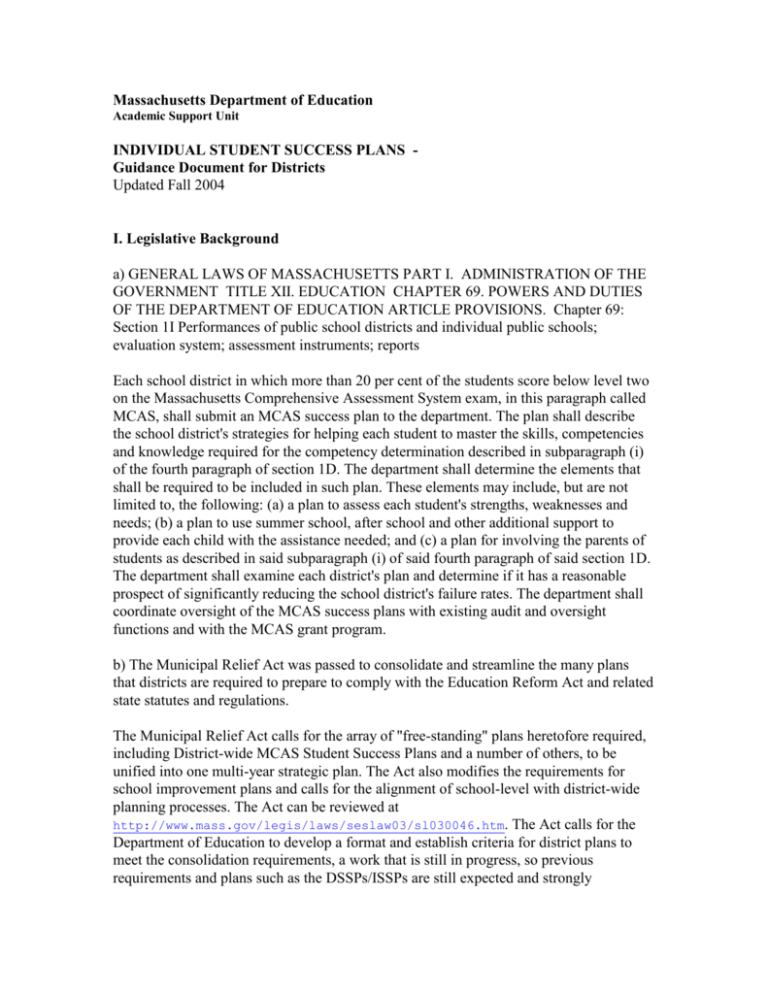
Massachusetts Department of Education Academic Support Unit INDIVIDUAL STUDENT SUCCESS PLANS Guidance Document for Districts Updated Fall 2004 I. Legislative Background a) GENERAL LAWS OF MASSACHUSETTS PART I. ADMINISTRATION OF THE GOVERNMENT TITLE XII. EDUCATION CHAPTER 69. POWERS AND DUTIES OF THE DEPARTMENT OF EDUCATION ARTICLE PROVISIONS. Chapter 69: Section 1I Performances of public school districts and individual public schools; evaluation system; assessment instruments; reports Each school district in which more than 20 per cent of the students score below level two on the Massachusetts Comprehensive Assessment System exam, in this paragraph called MCAS, shall submit an MCAS success plan to the department. The plan shall describe the school district's strategies for helping each student to master the skills, competencies and knowledge required for the competency determination described in subparagraph (i) of the fourth paragraph of section 1D. The department shall determine the elements that shall be required to be included in such plan. These elements may include, but are not limited to, the following: (a) a plan to assess each student's strengths, weaknesses and needs; (b) a plan to use summer school, after school and other additional support to provide each child with the assistance needed; and (c) a plan for involving the parents of students as described in said subparagraph (i) of said fourth paragraph of said section 1D. The department shall examine each district's plan and determine if it has a reasonable prospect of significantly reducing the school district's failure rates. The department shall coordinate oversight of the MCAS success plans with existing audit and oversight functions and with the MCAS grant program. b) The Municipal Relief Act was passed to consolidate and streamline the many plans that districts are required to prepare to comply with the Education Reform Act and related state statutes and regulations. The Municipal Relief Act calls for the array of "free-standing" plans heretofore required, including District-wide MCAS Student Success Plans and a number of others, to be unified into one multi-year strategic plan. The Act also modifies the requirements for school improvement plans and calls for the alignment of school-level with district-wide planning processes. The Act can be reviewed at http://www.mass.gov/legis/laws/seslaw03/sl030046.htm. The Act calls for the Department of Education to develop a format and establish criteria for district plans to meet the consolidation requirements, a work that is still in progress, so previous requirements and plans such as the DSSPs/ISSPs are still expected and strongly encouraged. NOTE: The Requirements regarding format and criteria for establishing one multi-year strategic plan has not yet been finalized. Until such time, districts are expected to continue to maintain the plans and requirements that were in effect before the Municipal Relief Act was passed. II. Department funded Academic Support Program Requirements Academic Support programs have requirements year to year in relation to ISSP/DSSPs. For example, in FY05 fund code 632/625 allocation grants to districts, ISSPs are noted as follows: LISTED UNDER RFP APPLICATION PRIORITIES: Proposed programs must provide identified students with small group instruction that addresses identified gaps in their acquisition of knowledge and skills in English language arts and/or mathematics as described in the students' Individual Student Success Plans; REQUESTED IN RFP APPLICATION QUESTIONS: 1a. Explain how Individual Student Success Plans will be used in designing the proposed program. b. Do all of the students who will be served with these funds have Individual Student Success Plans/individual student profiles/or content specific information on their IEPs? ___ Yes ___ No (If no, please explain.) INCLUDED UNDER GENERAL GUIDELINES: - REQUIREMENTS SECTION: Individual Student Success Plans (ISSPs) have been developed for students receiving services. - SUGGESTIONS FROM PROMISING PRACTICES SECTION: Clear evidence is provided that the Individual Student Success Plans (ISSP) are used to identify knowledge gaps for individual students and that instruction is targeted appropriately. NOTED UNDER DISTRICT/VENDOR GUIDELINES: The district has designated a person from its staff to document individual student progress on Individual Student Success Plans as a result of the program. For more information on these and other Academic Support grants, visit the Department’s web site at www.doe.mass.edu/as. III. General Guidance Over the past several years, the Massachusetts Department of Education has seen the development and implementation of Individual Student Success Plans (ISSPs) in districts and schools across the Commonwealth. While in many cases districts have needed to revise and refine their process for developing the ISSPs, great strides have been made in creating plans that work well and help to improve instructional support both during the school day and during extended day programs. Evidence that these plans are helping students may be reflected in the state’s MCAS scores, which show that increasing percentages of students are meeting the state performance standards. The Department recognizes the challenges that districts face in developing and maintaining these plans. While there is no “one-size-fits-all” Individual Student Success Plan, the Department has developed some strategies to help districts maximize the usefulness of the Individual Student Success Plans. The following guidelines were developed as a result of information gathered from numerous conversations with school personnel and documents collected by the Department. A. ISSP Development Because each district/school culture is different, it is important to have input from teachers, guidance counselors, administrators, resource staff, etc. when developing (and implementing) the ISSPs. Maintain the ISSPs as active working documents used regularly by all school personnel who work directly with the students. In addition to including documentation of student participation in academic support programs, have the ISSPs contain specific information on students’ strengths and weaknesses in math/ELA for teachers to use during regular classroom instruction. Make the format of the ISSP user-friendly enough to be understandable, as well as specific enough to be useful. Allow pertinent school personnel to have input about the ISSP format because the role of the people using the ISSP dictates which information is most useful to include. While some districts prefer to develop new ISSPs at the beginning of each school year, the district can weigh the pros and cons of updating ISSPs vs. developing new ISSPs. Skills that a student has acquired or obstacles overcome in the past may be important information for a teacher to know when providing instruction. School staff need to be properly trained to fill out ISSPs. A district may have a well-developed ISSP format, but the quality of the ISSP will depend on the details of the information listed. In some districts, ISSPs are filled out by staff who do not know the students. While this may be a time saving measure for the district/school, specific details on students’ strengths, weaknesses, and learning styles may not be listed because the person filling out the ISSP does not know the student and therefore, may not be familiar with that student’s learning style, strengths, weaknesses, etc. Caution must be used when filling out ISSPs so that incorrect information is not transmitted and so that valuable information is not lost. The districts may wish to consider providing professional development on the use of data. Although Testwiz has been a tremendous tool to help district’s breakdown MCAS scores area by area, viewing data does not necessarily mean that staff can translate the information into a good lesson plan. B. ISSP Implementation All teachers have some knowledge about a specific student’s learning strengths and challenges. While many teachers communicate informally with each other about students, collecting these pieces of information onto one document can allow it to be more uniformly shared. Such a practice can help the school work as a whole to assist the students with meeting the state standards, rather than having it be the sole responsibility of the English and math teachers. Make the ISSPs readily accessible to the teachers who work directly with the students. Distribute copies or provide appropriate access to these documents, so that they can be a resource that teachers use (and update) regularly. Consider providing time for access and/or discussion during professional development days, common planning time, and/or departmental meetings. For smaller districts, a paper ISSP may be the best way of communication. For larger districts, an electronic ISSP may be a more effective way for teachers to communicate. Create a process for regularly or annually collecting information regarding skills learned, successful strategies, etc. to add to the ISSPs. C. ISSP Evaluation Presently, the MCAS tests are the measure of determining whether a student meets the state performance standards in the ELA, math, and Science/Technology. MCAS tests are not given in each subject, every year, at each grade level however. Therefore, consider instituting annual benchmarks to assess student progress and evaluate whether a Student’s Individual Student Success Plan needs to be revised. IV. ISSP DESIGN ACTIVITY / SAMPLE ISSPs Three samples (A,B,C) of ISSPs are included below for discussion. After examining each sample, answer the following questions, determining which components of the ISSP would best meet the needs of your students and staff. Working as a group, develop or modify your district/school ISSP format. 1) Which part(s) would you consider to be the core of the ISSP? The core would contain essential information about the student, identifies specific strengths in math, outlines particular areas of weaknesses in the content, is relevant for grouping according to learning needs or instructional objectives. How would you rate the importance of this section compared to the others and why? 2) Which part(s) appear to be useful and pertains to student’s learning, but would be more useful if there were more details given. Why? 3) Which part(s) provide supportive documentation in the ISSP for a fuller picture, but is not essential in the design of the instructional program. Are there any drawbacks to including this section(s)? Why or why not? 4) Which part(s) of the ISSP do you not find useful? Why do you think they were included? For your information, the chart below includes elements of an ISSP. Elements of an ISSP Identifying Information Student's Strengths and Weaknesses in Math or ELA Multiple Assessment Data Instructional Supports to address student's learning gaps Benchmarks to assess how the student is making progress as indicated on the ISSP Documentation of Parent Communication NOTE: The following three samples are modified versions of ISSPs actually used in districts. They are presented not as definitive models to use, but as suggested formats to consider as options. SAMPLE A Plan Date: _10-17-02_ Individual Student Success Plan School District #1 Note : School District #1 believes that every student should have the opportunity to learn the skills and knowledge needed to meet state performance standards. This plan describes the needs of a student who has scored at level one on the English language arts and/or mathematics MCAS. The Student Success Plan is intended to describe, focus and communicate the instruction and supports for the student so that there is a coordinated strategy to help raise his/her educational performance. 1. Identifying Information Student Name: ___Student #1____________________________ SASID#: _____1111111111_____ School Year: _2002-2003__ Grade: _____6_____ 2. Communication Initial Communication/meeting: ___10-17-02___ Email________________ Primary Contact: ___Teacher #1________ Principal:___Principal #1______________________________ Review Date:__10-17-02__ Teachers/Providers: ______ Teacher #1 __________________ Review Date:__10-17-02__ _______Teacher #2 (after-school) ______ Review Date:__10-21- _______Teacher #3 (ASSP)__________ Review Date:__10-22- 02__ 02__ ____________________________________ Review Parent/Guardian Contact: ___Parent #1_________________ Letter Comments: Phone Date: ___________ Meeting Other 3. Assessment Information MATH ENGLISH/LANGUAGE ARTS MCAS Scaled Score: _218 (2002 4th grade math)_ MCAS Scaled Score: ___214_(2002 4th grade ELA)___ Other Standardized Test: 715_________________ Local Assessments: _______________________ Other Standardized Test: _______________________ Local Assessments: ___SRI ___________________________ Other Descriptive Information (strengths, learning needs, etc.) Student #1 understands the base ten number system to 100,000 and she is able to use expanded notation. She is unable to find equivalent fractions, including mixed numbers and to order fractions when the denominators are different. She is unable to convert fractions to decimals, but is able to order decimals. Knows most multiplication facts—has trouble with X6 and X8. 4. Priority Areas of Concern (as identified from analysis of assessment information above) MATHEMATICS (Specific skills, competencies, knowledge needed, instructional strategies, areas of weakness) Number Sense Patterns, relations, and functions Geometry Measurement ENGLISH LANGUAGE ARTS (Specific skills, competencies, knowledge needed, instructional strategies areas of weakness) Topic Development Needs to be more appropriate to task requirements 5. Strategies for Addressing Areas of Concern Programs Recommend Accepted/Declined Description School day options/programs __Content support_____________ study____________ _____________________________ ____________________________ _____________________________ ____________________________ _____________________________ ____________________________ Extended day/year options ___After-school program_________ Club_____________ Accepted Declined __Directed Accepted Declined Accepted Declined Accepted Declined Accepted Declined ____________________________ Accepted Declined __Homework ___Academic Support Program____ 2003__ _____________________________ ____________________________ Other programs/services _____________________________ ____________________________ _____________________________ ____________________________ Accepted Declined Academic Support –Spring Accepted Declined Accepted Declined ____________________________ Accepted Declined Accepted Declined 6. Implementation Plan Plan Date: 10-17-02 _______________ Plan Review Date: 6-02-03 Plan Contact:____ Teacher #1 Provider Name(s) Service Dates Duration _ Teacher #1 ____________ _classroom-directed study_____ _______10-17-02________ __10-02 to 6-03________ _ Teacher #2 _____________ help with homework__________ _______10-21-02________ ___10-02 to 12-02______ _ Teacher #3 ___________ _small group--math__________ _______1-09-03_________ ___1-09-03 to 4-18-03___ _________________________ __________________________ ______________________ _____________________ _________________________ __________________________ ______________________ _____________________ _________________________ __________________________ ______________________ _____________________ Progress check 1: _1-09-03_ Comment: Student #1 is now able to find equivalent fractions including improper fractions, but still cannot convert mixed numbers Progress check 2: ________ Comment: ___________________________________________________________________________ Comments: 7. Evaluation Date Result Pre-test: _______________ ________________ date: _______________ Date Result Post-test: ___________ __________ Next assessment Classroom performance assessment: Date: __________ Tool: ______________________________ Result: ______________ Other assessment/priorities: _____________________________________________________________________________________ Comments: Plan evaluation: ______________________ Date: ___________ Tool: __________________________________ Names: Recommendations for changes and/or additions to plan: SAMPLE B School District #2 Individual Student Success Plan 2002/2003 Student: Student #2 The Individual Student Success Plan describes the instruction and assistance available to each student who has scored below level two on the MCAS. It documents the ways in which a student will be helped to raise his/her academic performance and master the skills and knowledge needed to meet state performance standards. An important part of this plan identifies the learning strands and the learning standards the student needs to work on to meet the passing level on the MCAS test. Attached please find the Individual Profile of Objectives Report for the student named above. This report provides a scoring summary of each learning strand and learning standard for which the student was assessed during the MCAS testing and identifies specific areas that the student needs to improve. This plan is reviewed with each student by the coordinator of after-school support services and program instructors. This information is also provided to each student’s current teachers and serves to link instruction to individual student needs and support services. To help the student meet the passing level and satisfy the graduation requirements established by MCAS, School District #2 recommends the following academic support services: After-school support: Math Remediation Reading Remediation Test Preparation Additional Comments: _______________________________________________ Student Objectives Report MCAS Grade 10 2002 Student: Student #2 Teacher: School: District: Teacher #2 School #2 School District #2 Objectives/Strand Mathematics Math Mult. Choice: Math Open Resp.: Short Ans.: Number Sense Patterns, Relat.& Algebra Geometry: Measurement: Statistics & Probability Grade: Test Date: ID: Number Correct 12 of 31 6 of 24 25% 0 of 4 0% 6 of 12 50% 2 of 19 2 of 10 20% 1 of 7 14% 7 of 11 11 05/01/2002 123 Percent Correct 39% 11% 64% SAMPLE C School District #3 Individual Student Success Plan (ISSP) (Note: format developed by Watertown) Date: January 17, 2002 Student: School: School #3 Student #3 Grade: 10 SASID:1234567891 ISSP Coordinator: MCAS Scaled Scores State District School Student Student ELA receiving other services from: MathESL _____ 216 237 SPED _____ 248 _____ Section 504 248 _____ Other (specify) Explain services Science Areas of Weakness: English Language Arts Mathematics Shirley responded to every open response and short answer questions on the 2001 MCAS test; her scores ranged from 2-3. On the multiple choice portion of the test, her areas of weakness are geometry, patterns, relations and functions and statistics and probability. Science: ___________________________________________________________________________ __________________________________________________________________________________ Additional Assessments/Evaluations: DRA: _____ Iowa: Other (specify): Shirley scored 78% on the math mid-year assessment. Instructional Plan – English Language Arts Content: ___________________________________________________________________________ __________________________________________________________________________________ Method of Instruction: What type of specifically designed instruction is necessary for the student to make effective progress? Instructional Plan – Mathematics Content: Shirley will be placed in an Algebra III class and the Sunday tutoring sessions for math during second semester of the school year. She will specifically work on the following Happy Hills Public Schools Benchmarks within the curriculum: Geometry 4.g.7; Data Analysis 4.D.2; Patterns, Relationships, Algebra 4.D.4; Measurement 4.M.1 & 4.M.5. Method of Instruction: What type of specifically designed instruction is necessary for the student to make effective progress? Shirley would benefit from working in small groups, particularly in the area of solving open-response questions. Shirley would also benefit from one-to-one instruction, particularly in applications of geometry and needs to learn to ask clarifying questions and to check her work. Instructional Plan – Science Content: ___________________________________________________________________________ Method of Instruction: What type of specifically designed instruction is necessary for the student to make effective progress? Objective #1: Shirley will attend the Saturday Tutorial Session for mathematics during the spring semester. What will the student need to do to achieve this objective? Shirley will receive assistance from the MCAS Academic Support teacher for math to help her learn to ask clarifying questions and will attend the Saturday tutorial sessions. Assessment: Shirley will attend the Saturday sessions. Objective #2: Shirley will improve her scores on the math open responses, short answer and multiple choice questions in the areas of geometry, statistics and probability, and patterns and functions. She will also work to improve her open response scores from 2s to 3s. What will the student need to do to achieve this objective? The classroom teacher and the Academic Support teacher will focus on helping Shirley to take advantage of the small group instruction; learn to ask for help, and to teach her the content knowledge needed in these areas. Assessment: Shirley will pass the Saturday session tests and the Happy Hill Public Schools Benchmark Assessment with greater accuracy and with passing scores. Objective #3: Shirley will improve ability to solve short answer and open response questions. What will the student need to do to achieve this objective? Shirley will need additional practice in using strategies to solve short answer and open-response questions. Assessment: Shirley will improve her scores on short answer and open-response questions on the end-of-theyear test and Saturday tutorial tests to at least 3 on a scale of 0-4 for the open response questions and a 2 on a 02 scale for the short answer questions. Communication with parent(s)/guardian(s): Did parent accept the recommended services and strategies for addressing the areas of concern? ____Yes _____ No Date__________ Recommended services: (list) Saturday Tutorial Sessions (March to May 2002) Enrollment in Algebra III during second semester Person(s) responsible for communication with parents: Benny Fitt, IPHS Academic Coordinator Method of Communication: Letter Conference Telephone Other Comments: _________________________________________________________________________ Principal/Asst. Principal’s Signature Date End of Year Progress Report: ________________________________________________________ _________________________________________________________________________________
